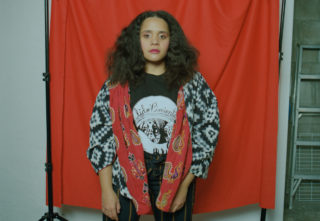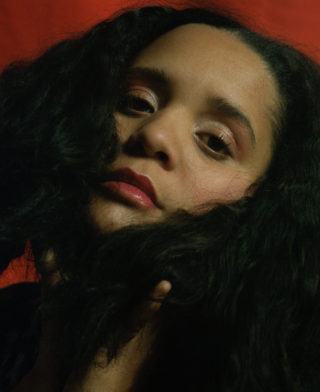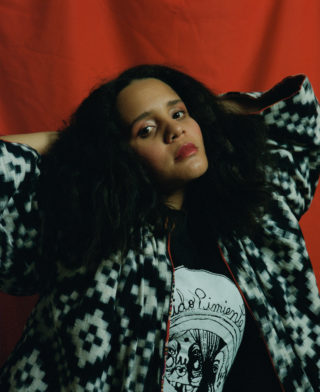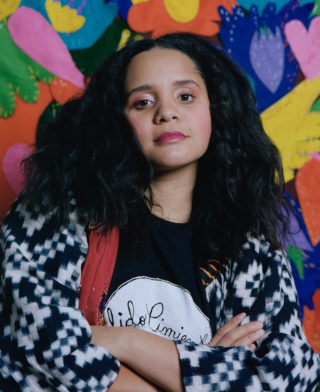From Colombia to Canada, everything Lido Pimienta does ends up being a political statement
The things society might understand as barriers – immigration, divorce, single motherhood – Pimienta embraces as part of life’s rich tapestry

The things society might understand as barriers – immigration, divorce, single motherhood – Pimienta embraces as part of life’s rich tapestry
In a deck of tarot cards, La Papessa, or the High Priestess, is depicted in blue. She sits under the tree of life, at the gates before the Great Mystery, halfway between the darkness and the light. The partially concealed scroll in her lap reads ‘TORA’ (‘divine law’). The High Priestess is the guardian of the unconscious, symbolising feminine intuition, self-discovery and the will to change through love and understanding. The thin veil that hangs behind her is all that separates us from the full knowledge of our inner selves.
“She is concentrating on her education, and on her power to grow on her own,” Lido Pimienta tells me. “And that’s what I did.” We’re chatting about her latest record (‘La Papessa’, after the tarot Priestess), and how it marks a chapter in her life. After separating from her husband, Pimienta explains, she was initially bereft, unsure whether she’d be able to write an album alone. Entering into what she calls ‘High Priestess mode’, she began writing and performing songs that dramatically detailed the end of her marriage, slowly connecting with musicians and artists in Toronto, where she’s currently based. By the end of the process she was creating music that celebrated her love for herself and for the community she’d forged along the way.
“You’re meeting me at this point where I’m figuring out who I am as woman, as a mother, who I am as an immigrant. Who I am as someone who collaborates with artists – from not just music, but dance and theatre. And so it is important to always make it clear that every album is a different chapter, every year that you get older is an opportunity to change, and that’s what I like to create.”


Born in Colombia to an indigenous family who were weavers by trade, Pimienta has lived what she describes as a ‘wild life’. She was raised in the shadow of an on-going civil war, and spent her childhood acutely aware of the injustices wrought by broken systems of power. “I started playing live shows when I was ten, eleven, in punk and metal bands, and hard-core bands. I grew up resisting a government. I grew up with a fear of being disappeared by the government because of my activism that started very, very, very young.”
Throughout her teenage years, she immersed herself in music, becoming especially obsessed with the trip hop scene. Periodically, Pimienta would travel from the city, where she lived in the vivid glare of ’90s global pop culture, back to the desert to visit her grandmother – it was during these trips that she came to understand herself as a person who would always live a hyphenated existence. “Like: to-the-city-to-the-desert, to-the-mountain-to-the-river. And then back to the city. Growing up like that, with all these different narratives. Living in a hyphen. Being a kid of the ’90s, watching MTV, but then every three months I had to be in the desert without a TV and trying to communicate with my grandmother and with the elders in their own language.”
Pimienta married young, aged just nineteen (“I don’t know what I was thinking. I don’t know what my mother was thinking – why she didn’t stop it.”), after fleeing to Canada to escape the civil war in Colombia. She gave birth to her son, now nine, when she was twenty-one, and released her debut album, ‘Color’, produced by then-husband Michael Ramey, in 2010. They separated soon afterwards and she found herself living in a house with two friends, sharing a single room with her infant son. Still, the things society might understand as barriers – early pregnancy, immigration, divorce, single motherhood – Pimienta has embraced as part of life’s rich tapestry.
She points out that her son was planned, that, in fact, she had him later than she would have liked. “I wanted to have my son when I was 20, and that was my dream. I had him when I was 21. The difficulty of it wasn’t even from my own life, it was the perception that other people had around this idea that why are you so young with a kid, this must be a mistake. But then, at the same time, that also motivated me because I just proved everyone wrong.”
Even through a faulty Internet connection, Pimienta exudes an incredible energy and sense of purpose. “I’ve always had conviction, and I’ve always had the motivation to be an artist. I feel if I’d wanted to be a doctor, be a lawyer, whatever I wanted to do I was going to do it, no matter what.”
She is grounded and articulate, speaking in precise sentences, utterly self-assured – as if she knows the answer to all your questions before you’ve even thought of them. “I don’t look at those times when I had to share a room with my son for three years as difficult. It was a big room that I turned into a little apartment. It was my music studio, my art studio – it had my desk where people would come over to write essays and stuff like that.” She breaks off for a moment and I hear the clatter of something in the background. As if she’s painting, or making dinner, opening and closing cupboard doors while we speak.
“When you want to do something you just do it. And people outside of you, they will tell you that this is impossible, and people will tell you that you’re stupid. People will tell you that you’re dumb because why would you make your life difficult. But then the joke’s on you because you know I’m entering my 30s, I’m just entering my 30s and my son is 9 years old. And the freedom that I have when I go on tour – I leave him with my best friend and I FaceTime him and then it’s over – so I’m able, because I was on that quest of being myself, doing what I wanted to do, doing what I wanted to do how I wanted to do it, I don’t ask for anyone’s favours. I don’t give account to anyone. I guess that’s a part of the message that I carry in my music. Let me show you how I’ll kill it. I’ll do great.”
The sense of injustice that drove her childhood activism is still palpable, bubbling through her work, culminating in a cultural mash-up where the personal and the political collide. At her shows, she doesn’t shy away from the power imbalances at play in the room, asking audience members who might feel uncomfortable because they are in a minority to step to the front, creating a safe space for people who might feel vulnerable. During a recent performance at the Halifax Pop Explosion music festival, several white audience members and a white volunteer photographer reacted violently when she asked for “brown girls” to step to the front of the venue. The festival organisers issued an apology, acknowledging that their volunteer had displayed “overt racism”, and promising to do better.
Although her political actions seem considered, Pimienta explains that the political inflections of her practice happen, if not by accident, then unconsciously – as an inevitable response to the cultural landscape. “I think that in 2017, people our age, or millennials or whatever you want to call it, we can’t really escape the political landscape that we’re trying to survive in. I don’t make music that is ‘this is the song that’s going to change the world’, that’s not why I write. I write music that resonates with people that are tired of being pushed around. And, I think, music that people enjoy, and that resonates with folks that are interested in a voice that is not heteronormative. So you know I make songs about polyamory, and impossible love. This is the world that I live in and its not a conscious decision, but it still consciously comes out.”
Her hybrid identity, she implies, makes her especially sensitive to the fraught global politics under which we all live. “I cannot ignore it. It’s just interesting when you live in this hyphen – like Canadian-Colombian-Indigenous-Black – all the hyphens and all the boxes that I can check off in any application or whatever. I am stuck in this hyphen so it doesn’t matter. If I wanna write a song about flowers, it ends up being political, just because of my body, just because of, you know, not singing in English. Everything that I do, whether I like it or not ends up being a political statement, even if I’m just writing about fucking, you know?”

If previous work has only been unconsciously political, then the next album, she tells me, is deliberately, definitively so. Living in Canada she has begun to reflect on the country’s legacy of colonialism, and the parallels it has with the political turmoil that endures in Colombia. She is outraged that the colonisation of Canada by the English and French is “Canada’s little secret”, more or less invisible to tourists and recent immigrants. She tells me that indigenous Canadians have the highest rate of incarceration of any ethnic group in the country.
“In jail on your own land! That was really odd, trying to understand – am I a settler too? What is my participation in this Canadian project? So I was figuring it out. Me being a Canadian. Me as maybe not so much an immigrant any more because I’ve been here for a decade. I’m thinking about my home country because every year that goes by that becomes more strained. More distant, like I don’t feel like I belong there as much. I’m writing about that. These are the songs I’m writing now. It’s like the cynical love letter to my country. Because you know I love my country but I have so much beef with it.”
Some of this beef stems from the result of the Colombian referendum in 2016, when the populace voted to reject a peace agreement to end fifty-two years of war with Farc guerrillas. (A revised, though fragile, peace deal was signed in November last year, and the Farc began disarming in February 2017.) Her enduring anger at the conservative attitudes in her homeland is the driving force for this next chapter. “All the right wing, the Christians – and the church is involved – the family; in politics anti-abortion is a big thing, all of this pro-life. Extreme right. Anyone who is a nationalist, you know ‘I’m a nationalist’ it always means zero immigrants, don’t bring anyone else here. So those people, who control the media, control the police, control the government; they decided that they didn’t want the peace agreement. The president we had before the one we have now, his hands are covered in blood. But he’s a politician so nothing’s gonna happen to him.”
The paramilitary Farc, she explains – though reviled by the right-wing media and much of the public – were mostly recruited as child soldiers. “For the most part [they] are young, poor, poor kids that were brought to war when they were children. And they grew up with nothing else, because the government never offered them a better opportunity. And those people they’re chastised, and they’re rejected by the community because ‘they’re murderers’ – well what are you gonna do when you’re eight years old and they give you a shot gun and they tell you ‘now you are called paramilitary’ and you don’t know where your parents are?
“So that’s the research that I’m doing and those are the things I’m doing for the next album. Because it would be so easy for me to write an album about queer or hetero love and just write like the Sam Smiths and the Selina Gomezs of the world. That would be so easy for me. But you know that’s just,” she gives a long exhalation. “It’s dumb.”
There’s a cultural shift, she explains, and she wants to be part of it – a chance, maybe, to make things better. “I feel like our generation is far more interested in bringing truth forth, and far more interested in like, ‘hey, I wanna have an ocean and be able to swim in it with my children next year.’ So that’s pretty much it. That’s the moving elements. That’s the pushers of the things that I do.”